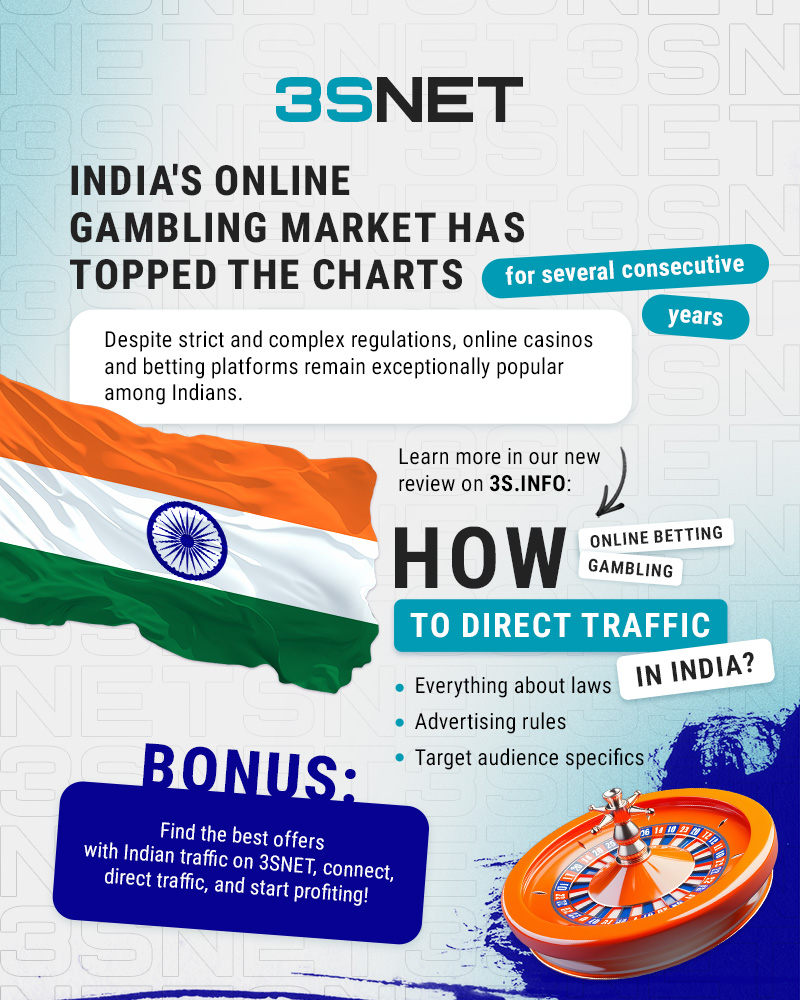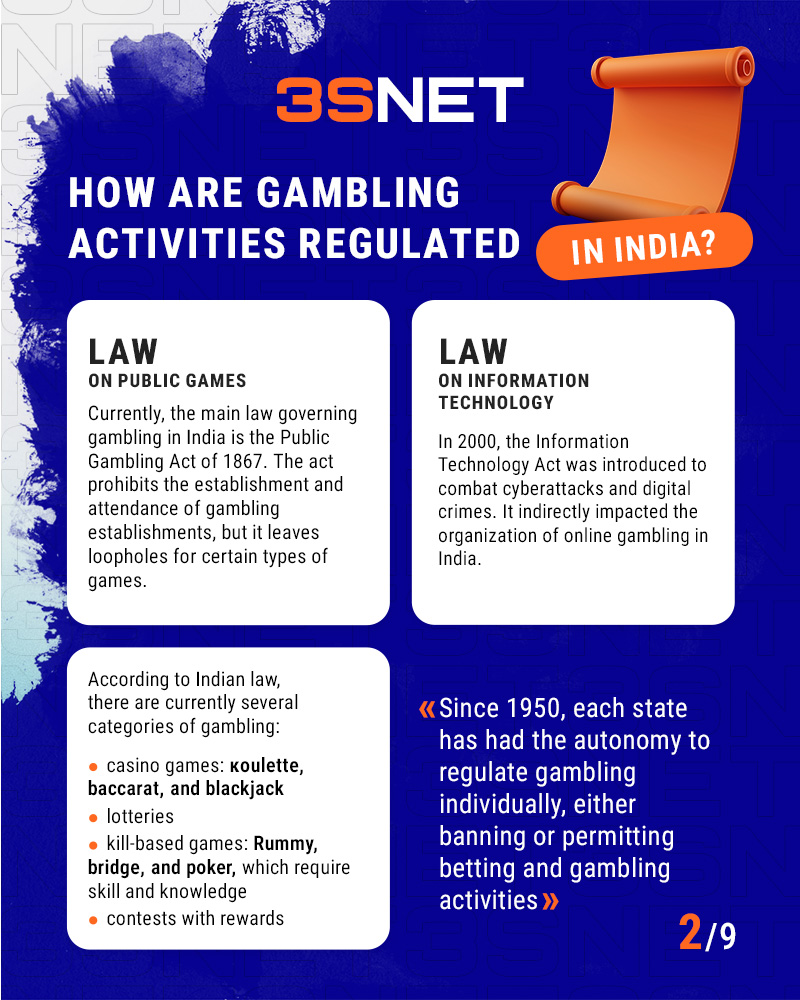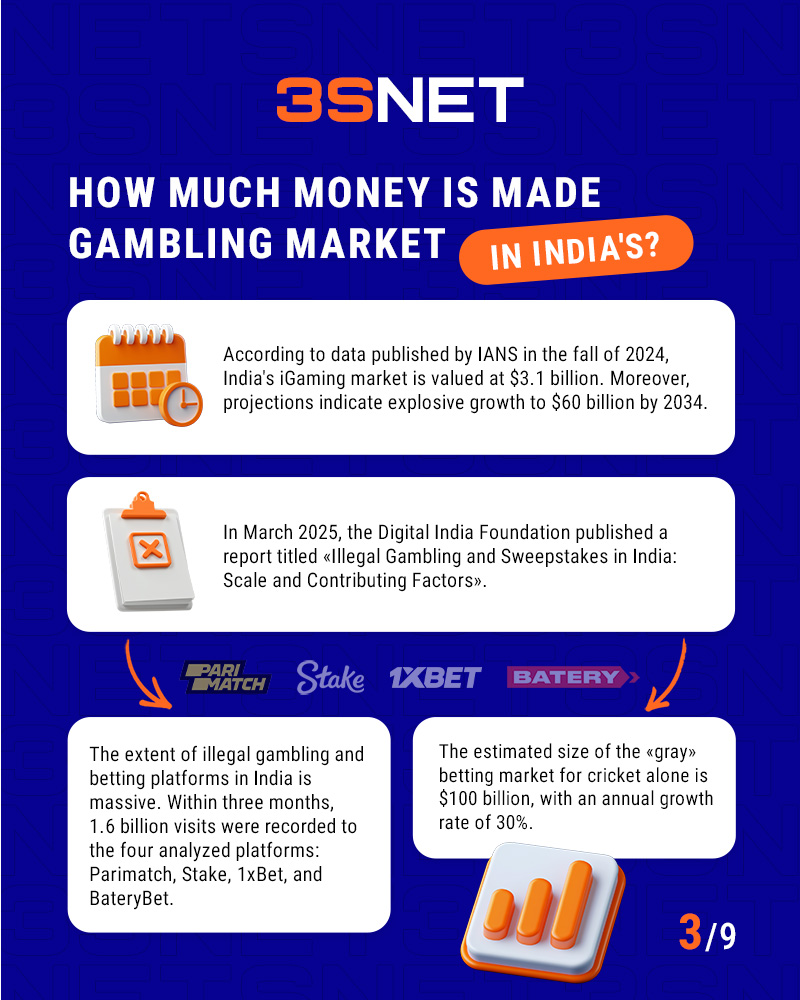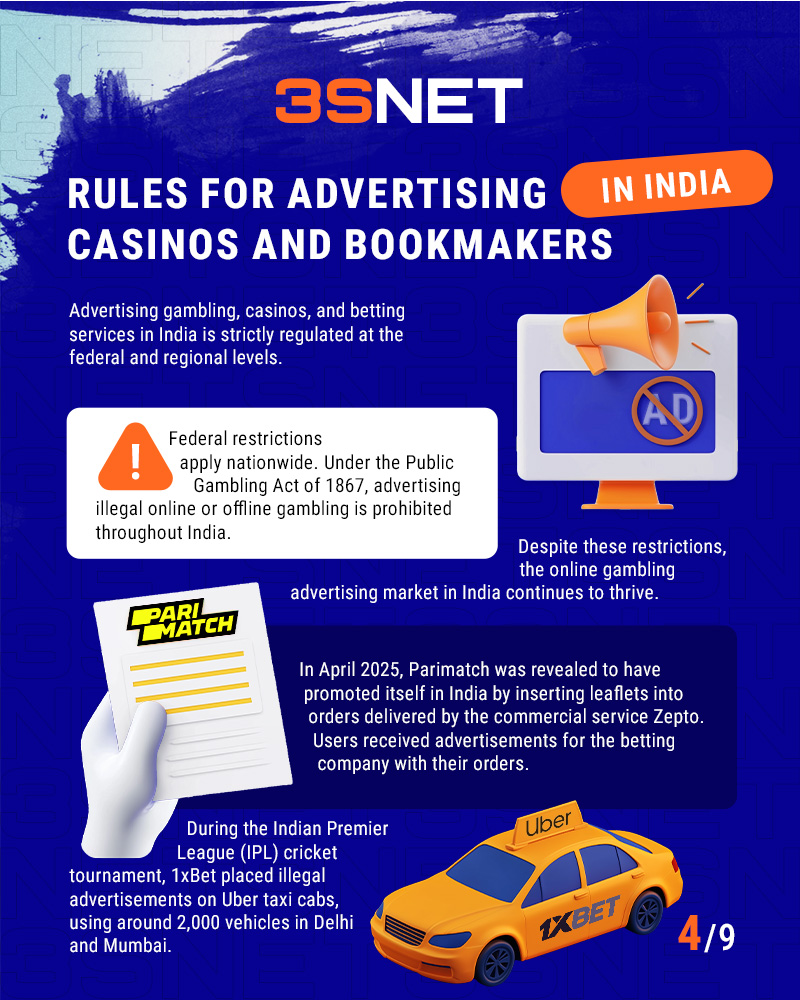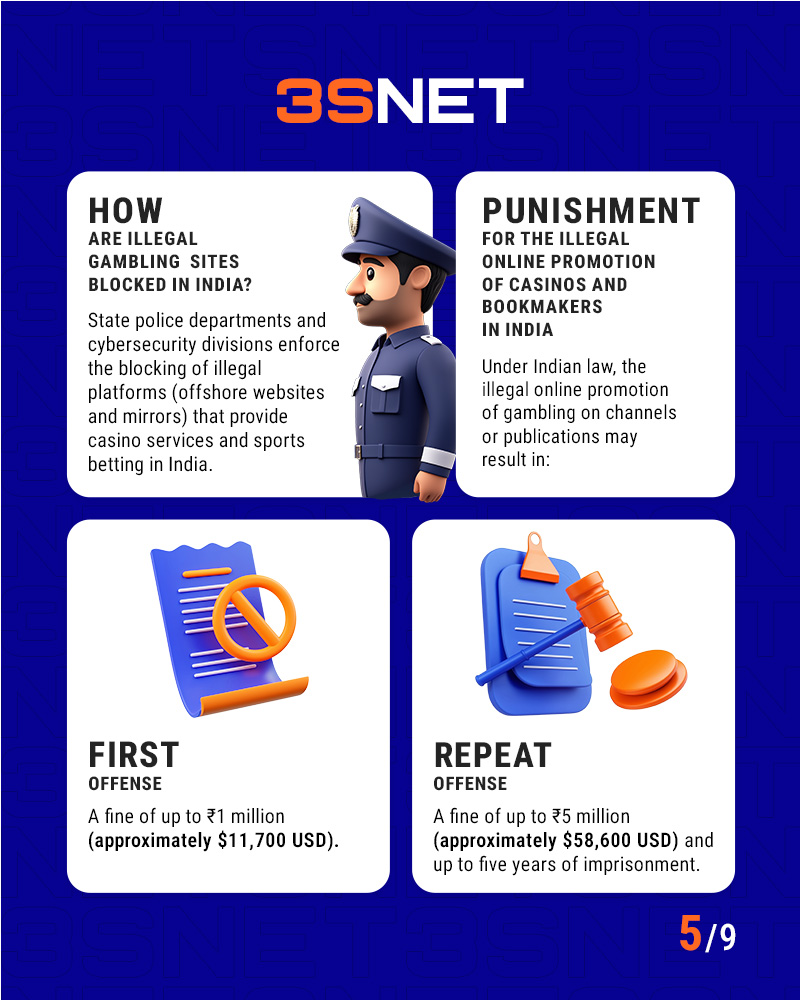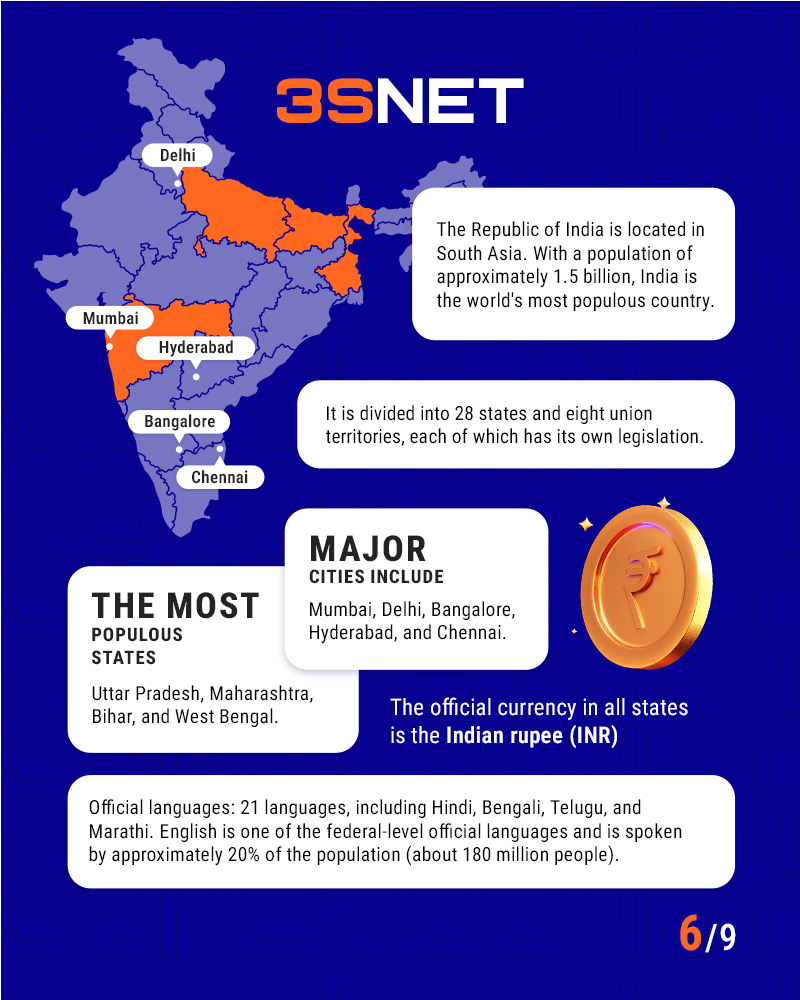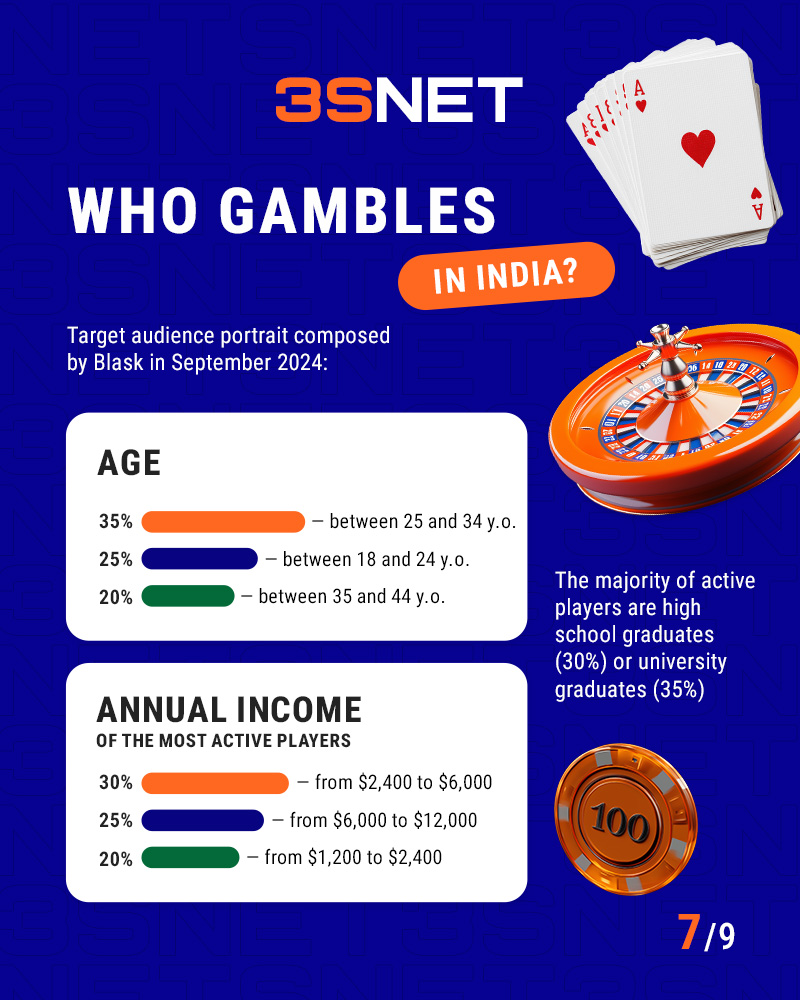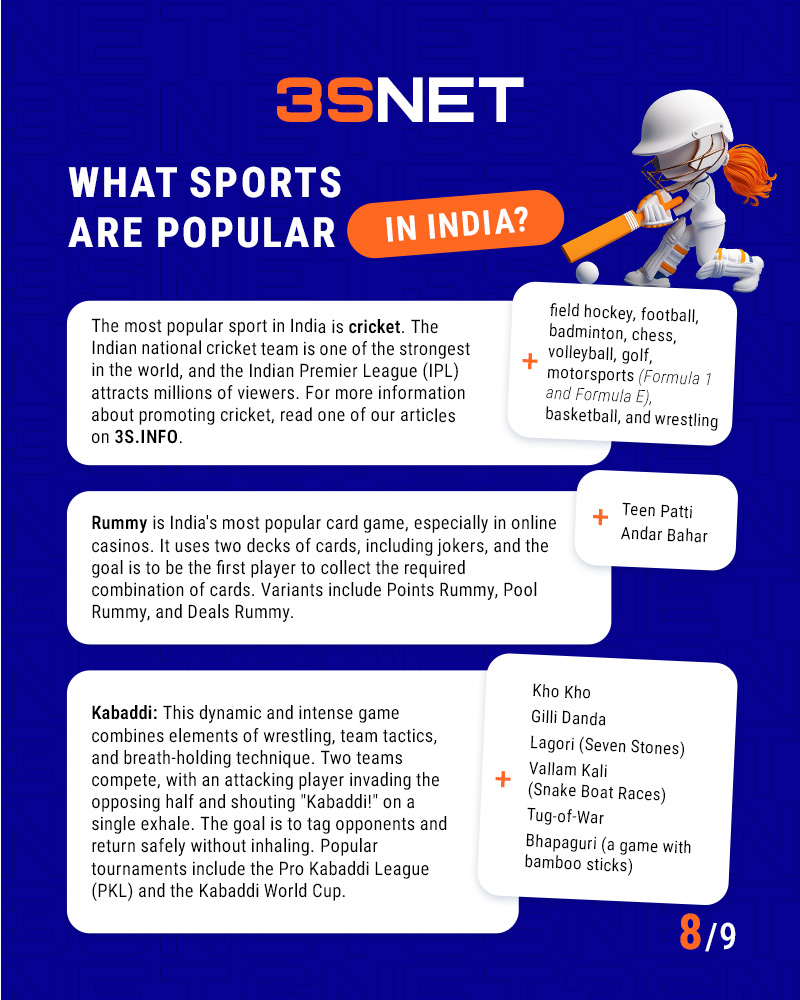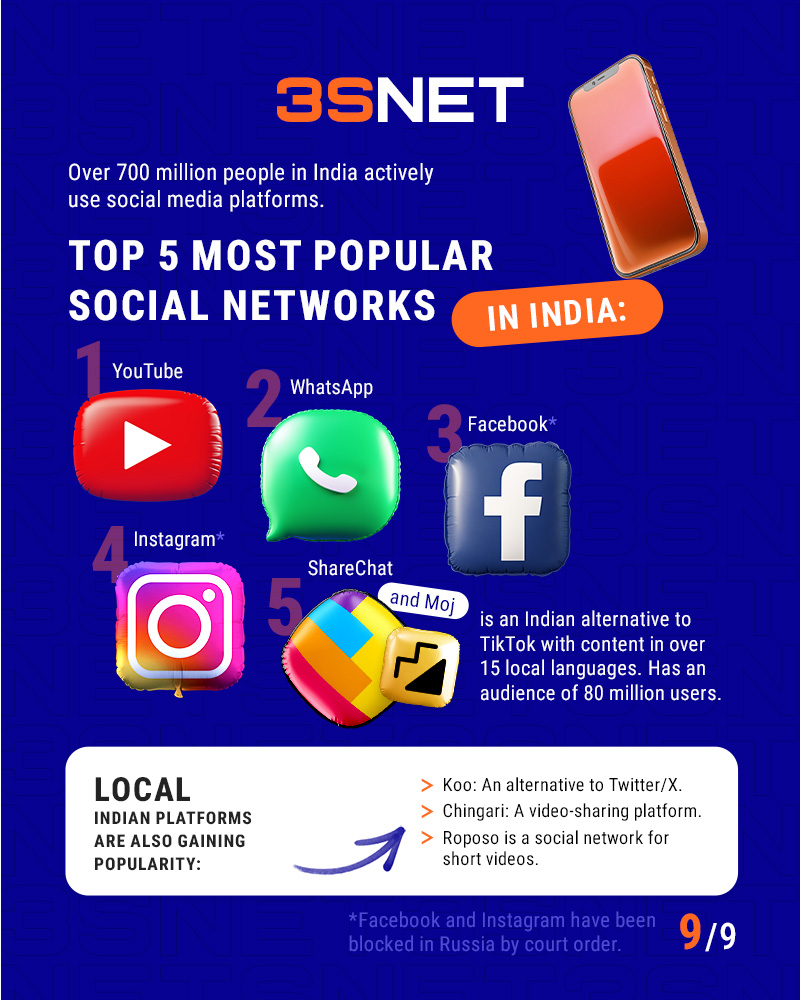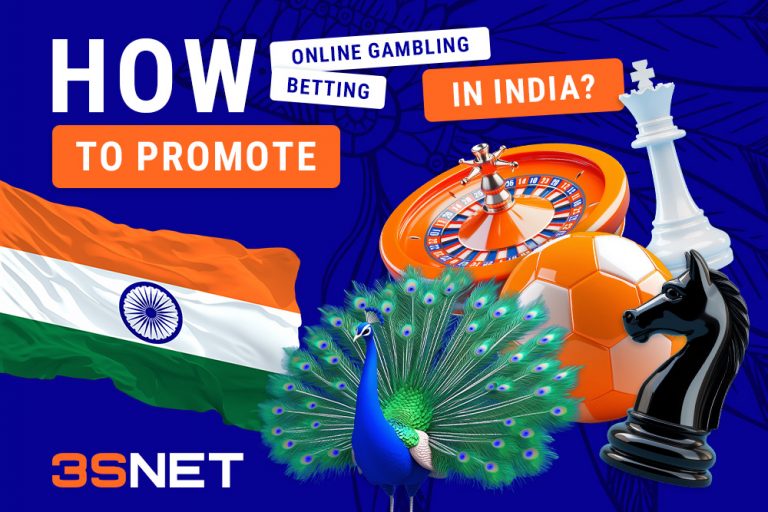
Last Updated: 6 november 2025
India’s gambling market has been number one for several years. The reason is that, despite strict and complex regulations, online casinos and betting shops are incredibly popular among Indians. In a new review on 3S.INFO, find out more about “How to Direct Traffic to Online Betting and Gambling in India”: everything you need to know about laws, advertising rules, and the characteristics of the target audience.
16.06.2025 We’ve added an engaging infographic about gambling in India! Scroll to the end to learn how to engage local users, capture their attention, and work effectively with them.
How is gambling regulated in India?
Gambling in India was first mentioned in the epics “Rigveda” and “Mahabharata,” where the fate of heroes hinges on the game of dice. Attitudes toward gambling have evolved over time. During the Mughal Empire, it was regarded as a pastime for the royal family and the elite. Later, British authorities banned public gambling but supported the flourishing of traditional Indian games*.
*Read more about the features of traditional games and sports in India below.
Today, however, the main law regulating gambling in India remains the Public Gambling Act of 1867. This law prohibits the organization and operation of gambling houses but leaves loopholes for certain types of games.
In 1998, the Lotteries Act was enacted, allowing for the regulation of lotteries across India.
In 2000, the Information Technology Act was introduced to combat cyber-attacks and digital crime, which indirectly influenced the organization of online gambling in India.
Currently, according to the law, there are several types of gambling permitted in India:
- Casino games (specifically: roulette, baccarat, blackjack);
- Lotteries;
- Skill games that require knowledge and skill: rummy (read more about traditional Indian games), bridge, poker.
- Contests with prizes.
Additionally, since 1950, each state has had the authority to regulate gambling independently, allowing or prohibiting betting and gambling as they see fit.
In October 2025, India established a new regulatory body – the Online Gaming Authority of India, which will enforce the introduced ban on online gambling games. Reporting to the Ministry of Electronics and IT, the regulator is authorized to issue five-year licenses to gaming platforms, reject non-compliant applications, impose sanctions for violations, and maintain a registry of prohibited real-money games.
Which Indian states permit gambling and betting?
- Since 1976, land-based casinos (only in 5-star hotels) and casinos on floating platforms have been permitted in the state of Goa. These casinos operate under a local license, and entry is allowed only for foreigners or Indian tourists from other states. The largest floating casinos are located in Panjim and Mormugao, attracting approximately 1.5 million visitors annually. The entrance fee for these casinos can be up to INR 5,000.
- In Daman, land-based casinos are allowed with restrictions on the number of users. Daman Casino and Casino Carnival are among the most popular, with entry fees up to INR 3,000 and minimum bets starting at INR 100. Casino attendance in Daman is about five times lower than in Goa.
- Offline casinos for foreigners are permitted in Diu.
- In Sikkim, since 2008, only online casinos (poker, roulette) and sports betting (through licensed platforms like Betway and 1xBet) are allowed. The Directorate of Sikkim State Lotteries issues betting and gambling licenses.
- In Nagaland, sports betting, skill games (poker and rummy), and fantasy sports are permitted. Licenses are issued by the Nagaland Taxation & Gambling Regulatory Department, with costs ranging from 10 to 25 lakh rupees (local unit of measurement equal to one hundred thousand), which translates to approximately 12,000 to 30,000 U.S. dollars. Notable platforms operating legally in Nagaland include PokerStars India, Adda52, Dream11 (fantasy sports), and RummyCircle.
- As of 2021, the state of Meghalaya has legalized and licensed both online and land-based gambling within its borders.
- Only fantasy sports (Dream11, MyTeam11, MPL Fantasy) are allowed in the state of Tamil Nadu.
How much money is made in the Indian gambling market?
According to IANS data published in the fall of 2024, the iGaming market in India is estimated at $3.1 billion. By 2034, it is expected to grow tremendously to $60 billion.
In March 2025, the Digital India Foundation released a report titled “Illegal Gambling and Sweepstakes Market in India: Scale and Contributing Factors,” which highlighted the following points:
- The scale of illegal gambling and betting in India is enormous, with 1.6 billion visits recorded on four analyzed platforms—Parimatch, Stake, 1xBet, and BateryBet—in just three months.
- The volume of the “grey” betting market for cricket alone is estimated at $100 billion, with an annual growth rate of 30%.
Advertising rules for casinos and bookmakers in India
In India, the advertising of gambling, casinos, and betting services is strictly regulated at both the federal and state levels.
- Federal restrictions apply throughout the country: The Public Gambling Act of 1867 prohibits all online and offline advertising of illegal gambling.
- In the states of Goa and Daman, where land-based casinos are permitted, advertising is allowed within the premises of the establishments themselves.
- In Sikkim, sports betting advertising is permitted only if it targets residents of the state and individuals over the age of 18.
Despite these strict regulations, experts indicate that the online gambling advertising market in India is thriving:
- In April 2025, Google published data on ad and account suspensions. In 2024, a total of 247.4 million ads and 2.9 million accounts were blocked in India for violating service rules, including those related to promoting betting and gambling.
Despite the strict ban, gambling operators are looking for other opportunities. For instance, in April 2025, it was reported that Parimatch was promoted in India through flyers included with orders from the commercial service Zepto. All users received advertisements from the bookmaker along with their deliveries.
Additionally, bookmaker 1xBet placed illegal advertisements on Uber cabs during the IPL cricket tournament, utilizing approximately 2,000 vehicles in Delhi and Mumbai for this purpose.
How are illegal online gambling websites blocked in India?
Illegal platforms (offshore sites and mirrors) offering casino and sports betting services in India are blocked by various state police and cyber security departments.
What is the penalty in India for illegal advertising of casinos and bookmakers online?
Under Indian law, owners of channels or communities can face penalties for illegally promoting gambling on the Internet:
- For a first offense: a fine of up to 1 million rupees (approximately US$11,700).
- For a second offense: a fine of up to 5 million rupees (approximately US$58,600) and up to 5 years in prison.
In April 2025, Indian police arrested nine Instagram* bloggers who were promoting illegal casinos. The cost for posting one video was around US$82, and the influencers also received commissions as affiliates. Among the products being promoted were Rajagames and 1win.
* Instagram has been blocked in Russia by a court decision.
How Indian players are attracted to casino and bookmaker sites
The Republic of India is located in South Asia. It is the largest country in the world in terms of population with about 1.5 billion people. It is divided into 28 states and 8 territories, which have their own legislation.
According to the data for 2024, the largest states by population are Uttar Pradesh (about 240 million people, which corresponds to the number of inhabitants of all of Brazil!), Maharashtra (126 million), Bihar (128 million), West Bengal (100 million).
The top 5 largest cities in India include the financial capital Mumbai (22 million people), the political center of the country Delhi (20 million people), the “Indian Silicon Valley” Bengaluru (14 million), a major technological and pharmaceutical center Hyderabad (about 12 million), in the south of India – Chennai (11 million).
The status of official language has 21 languages, the largest number of speakers – Hindi (more than 40% of the population), Bengali, Telugu and Marathi. English is one of the official languages at the federal level. About 20% (up to 180 million people) of the country’s population speaks it.
The official currency in all states is the Indian Rupee (INR).
The Internet and Mobile Association of India (IMAI) predicts that the number of smartphone users will exceed one billion by 2025.
- Some more details: Geo India. Indian traffic: features and approaches, difficulties and limitations.
Who gambles in India?
The portrait of the target audience was compiled by the Blask service in September 2024.
- Age: The majority of players are between 25 and 34 years old (35%), followed by the youngest audience aged 18 to 24 years (25%). About 20% of players are between 35 and 44 years old.
- Annual Income: The annual income of the most active players (30%) ranges from $2400 to $6000, followed by players with income from $6000 to $12000 (25%) and from $1200 to $2400 (20%).
- Education: The most active players include high school graduates (30%) and university graduates (35%).
Which gambling operators (casino and bookmaker brands) are popular in India?
In April 2025, iGN x Blask unveiled the Top 10 Operators in India for March 2025:
- The AI-based Acquisition Power Score (APS) metric assesses a brand’s potential ability to attract new customers.
- The Competitive Earning Baseline (CEB) metric indicates the brand’s potential revenue.
Top 10 Gaming Operators in India 2025
| Market position | Operator | Market size % | APS
(mln people) |
CEB
(mln $) |
| 1 | Stake | 22,14 | 3,59 | 393,4 |
| 2 | Parimatch | 11,99 | 1,99 | 276,6 |
| 3 | Dafabet | 10,48 | 1,74 | 272,3 |
| 4 | 4RABET | 7,12 | 1,17 | 134,6 |
| 5 | Winmatch | 6,51 | 1,06 | 93,28 |
| 6 | 1xBet | 4,01 | 0,67 | 88,79 |
| 7 | BC.Gаme | 3,14 | 0,53 | 66,65 |
| 8 | Skyexch | 2,48 | 0,43 | 69,55 |
| 9 | IPLwin | 1,98 | 0,35 | 50,58 |
| 10 | 1win | 1,94 | 0,34 | 45,72 |
What sports are popular in India?
Modern sports are popular in India:
- The most popular sport in India is cricket. The Indian cricket team is one of the strongest in the world, and the Indian Premier League (IPL) attracts millions of viewers. Read more about how to drive traffic to cricket in one of the articles on 3S.INFO.
- Field hockey is officially the national sport of India. In the 20th century, India won eight Olympic gold medals in this sport.
- Like other sports from India’s colonial past, football is also popular, especially in the states of West Bengal, Goa, Kerala, and the Northeast. The Indian Super League (ISL) competitions and SAAF matches generate significant interest in this sport.
- Indian badminton boasts strong players like P.V. Sindhu (Olympic champion) and Srikanth Kidambi (World champion).
- India is the birthplace of chess, and this sport is also very popular.
- Volleyball is more popular in rural areas, and the Pro Volleyball League is helping to promote its development.
- There is also interest in wrestling (Kushti), golf, motorsports (Formula 1, Formula E), and basketball in India.
- The popularity of Indian wrestling was highlighted by the 2016 film “Dangal,” which was based on real events and became one of the highest-grossing sports movies in the world.
- You can find all important competitions and events that attract players from India to betting sites in the 3SNET Sporting Events Calendar.
What traditional sports are popular in India?
Among the traditional games of chance in India, card games are particularly prominent:
- Rummy is the most popular Indian card game, especially in online casinos. The game uses two decks of cards with jokers, and players must be the first to collect the required combination to win. The main variations are Points Rummy, Pool Rummy, and Deals Rummy.
- Teen Patti is a traditional Indian card game that is particularly popular during festivals, weddings, and among friends. The name translates from Hindi as “three cards,” as each player is dealt three cards. The most common variants of the game include Mukhbal (Muflis), AK47, and Joker Teen Patti. In most states, it is only allowed in a social format, but you can find online versions such as Teen Patti Gold and Ultimate Teen Patti.
- Andar Bahar is a game known for its simplicity and dynamic nature. The name translates from Hindi as “Inside-Outside,” which reflects its essence: players bet on whether a matching card will appear inside (Andar) or outside (Bahar) the main card. The game is legal in casinos in Goa, Daman, and Sikkim, and the online Live Andar Bahar format is highly sought after. Andar Bahar is also available on international platforms like Ezugi and Evolution Gaming.
Traditional outdoor games are also popular among Indians:
- Kabaddi is a dynamic, intense and spectacular game that combines elements of wrestling, team strategy and breathing techniques. Two teams compete, with the attacking player entering the opponent’s half and shouting “Kabaddi!” on a single exhalation. The goal is to touch the opponent and return to one’s own half without taking a breath. The most popular tournaments are the Pro Kabaddi League (PKL) and the Kabaddi World Cup.
- Kho Kho, often referred to as the “Indian steeplechase”, is a team game that incorporates elements of strategy and agility. It is one of India’s most popular national sports, along with Kabaddi, and has been included in the 2022 World Games. One team (the runners) tries to evade capture while the other team (the catchers) tries to tag them. The catchers squat in the middle of the field in a staggered formation and shout “Kho!” as they try to touch a runner. India has had a national championship in the sport since 1914.
- Gilli Danda is a hybrid of baseball and cricket with a history spanning over 2500 years; it is mentioned in ancient texts as “tipcat”. The “gilli” is a small wooden stick (5-10 cm) pointed at both ends, while the “danda” is a long stick (60-90 cm) used as a bat. Players strike the gilli with the danda to throw it into the air and then strike it away. While the gilli is in the air, players must run to a designated point and back. Since 2016, national championships for gilli danda have been held in India, and there is even an academy for training in Madhya Pradesh. In 2017, this game was included in the program of the World Games of Traditional Sports.
- Lagori (or 7 Stones) is a ball-and-stone game that resembles a cross between dodgeball and gorodki. The game begins with seven flat stones (or wooden blocks) stacked in a pyramid formation. One team throws a ball to break the pyramid, while the other team tries to rebuild it. Lagori is most popular in southern India (Karnataka, Andhra Pradesh, Tamil Nadu) and northern states (Haryana, Punjab), where it is known as “Pithoo Garam”.
Different regions of India have their own traditional games: for example, Vallam Kali (snake boat races) in Kerala, Tug-of-War during festivals in Rajasthan, and Bhapaguri (a game with bamboo sticks) in Assam.
What casino games do Indian residents choose?
In April 2025, GR8 Tech partnered with iGB to publish a joint report titled “India 2025: How to Seize the Opportunities.”
- The majority of users (77%) prefer to play from mobile devices.
- Live games are the most popular, with casinos generating 56.4% of revenue and slots accounting for 47.5%.
- Aviator and JetX are particularly popular, with Aviator alone contributing 21% of one operator’s revenue.
- Skill-based games (as opposed to luck-based games) are gaining traction, including Teen Patti, Andar Bahar, and other crash games.
- Experts highlight the boom in fantasy sports, especially fantasy cricket, which is projected to generate revenues of 388 billion rupees by 2026.
According to the Blask service (as of April 2025), the most popular games among Indians include Aviator, Legacy of Dead, Wanted Dead or a Wild, Book of Dead, and Majestic King.
What betting and gambling creatives are used in India?
Images of prizes and visualizations of different values can be used to attract people from India to online casino and bookmaker websites. These elements depend on cultural values, economic conditions, and popular trends.
- Practical Gifts: Indians value tangible prizes that always attract attention, such as smartphones (the most popular brands are Samsung, Apple, OnePlus, and Xiaomi), laptops, home appliances (TVs and refrigerators), various jewelry, scooters and motorcycles (Honda, TVS, Bajaj), as well as electric cars and scooters (Ola Electric, Ather).
- Virtual and Digital Prizes: Different audiences may be attracted by virtual and digital prizes such as cryptocurrency/NFTs, in-game currency/skins, and premium subscriptions (YouTube Premium, Spotify).
- Images of Legal Casinos: To capture attention, you can use images of legal casinos in India with their luxurious interiors, such as Deltin Royale, Casino Pride, and Big Daddy Casino in Goa, as well as Casino Sikkim and Denzong Casino in the state of Sikkim.
- Local Preferences: It is important to consider local preferences since different things are popular in different states. Additionally, religious and cultural sensitivities must be taken into account; for example, alcohol may not be an appropriate prize in some communities.
- Festivals and Free Time: Players’ activities depend on their free time and mood. India celebrates a vast number of festivals—around 40 dates throughout the year—but weekends vary by state. Major festivals like Diwali and Holi are celebrated nationwide, while some festivals (such as Onam or Pongal) are specific to certain states. Nationwide celebrations include Republic Day on January 26, Independence Day on August 15 (marking liberation from British rule in 1947), and Gandhi Jayanti on October 2 (Mahatma Gandhi’s birthday). There are also holidays for various religions including Hinduism, Sikhism, Islam, Christianity, Buddhism, and Jainism.
What are the payment options in India?
According to GR8 Tech and iGB (April 2025), UPI (Unified Payments Interface) is the most important payment system for Indian users. About 90% of deposits to bookmakers and casino sites are received through it.
What are the most popular traffic sources for people in India?
In India, more than 700 million people actively use social media.
Top 5 most popular social networks in India:
- YouTube: With an audience of 500 million users, YouTube is particularly popular for short videos (YouTube Shorts).
- WhatsApp: Approximately 487 million users utilize WhatsApp.
- Facebook: With 314 million users, Facebook is more popular among businesses and the older generation.
- Instagram: Instagram has 250 million users and is most popular among young people, bloggers, and brands, with Reels being the most viewed content.
- ShareChat (and Moj): An Indian alternative to TikTok, ShareChat offers content in over 15 local languages and has an audience of 80 million users.
* Social networks Facebook and Instagram have been blocked in Russia by court order.
Localized Indian platforms also gain popularity:
- Koo: An alternative to Twitter/X.
- Chingari: A video platform.
- Roposo: A social network for short videos.
What Internet services are blocked in India?
In January 2020, the Indian Ministry of Information Technology blocked 59 different internet services simultaneously. The reason cited was “damage to India’s sovereignty, integrity, national security, public order, and defense.” The banned services included video platforms TikTok, Kwai, and Likee; the WeChat messenger; the Chinese social platform Weibo; and browsers such as UC Browser, CM Browser, and APUS Browser. A complete list of all blocked sites (not limited to gambling and betting) can be found on the website.
Gambling in India is an intricate mix of ancient traditions, digital innovation, and diverse regulations. Already delivering remarkable outcomes for casino and betting promotions, the industry holds immense untapped potential. On 3SNET, discover top-tier offers targeting Indian audiences, get connected, drive your traffic, and reap lucrative profits!
Share it with your friends via favorite social media
